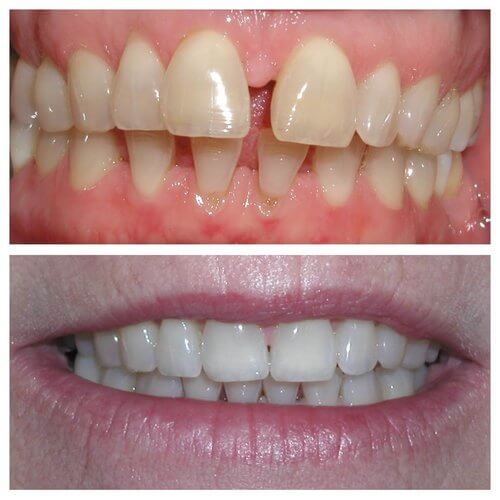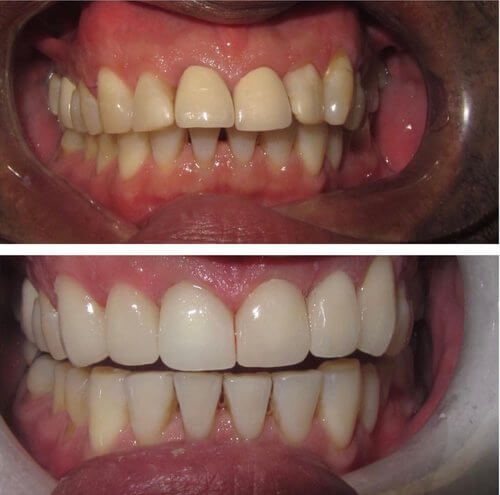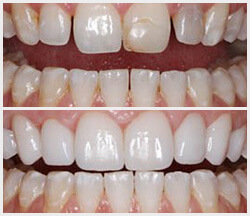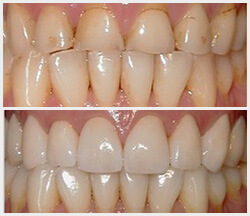Gum Disease and Its Broader Health Effects: What You Need to Know
Did you know that gum disease can have broader impacts on your overall health? If you suspect you have gum disease, it’s essential to seek the guidance of trusted dental professionals. With years of experience and a commitment to patient-centered care, our dentists in Staten Island can provide you with the support you need to manage and prevent gum disease.
Gum Disease: What Is It?
Gum disease is a bacterial infection that affects the tissues and bones that support your teeth. It starts with the development of plaque, a sticky film of bacteria that forms on your teeth and gums. If plaque isn’t removed by regular brushing and flossing, it can harden into tartar and lead to gum inflammation, also known as gingivitis.
When gingivitis goes untreated, it can progress to periodontitis, a more severe form of gum disease that can cause the gums to recede, exposing the roots of the teeth. Periodontitis can also cause the bone supporting the teeth to deteriorate, leading to tooth loss among other symptoms.
The Broader Health Effects of Gum Disease
Gum disease can have broader health effects beyond oral health. Research has linked gum disease to various health conditions, including:
- Cardiovascular disease: Studies have found a link between gum disease and an increased risk of heart disease and stroke. The bacteria that cause gum disease can enter the bloodstream and travel to the heart, causing inflammation and damage to blood vessels.
- Diabetes: Gum disease can make it harder to control blood sugar levels, increasing the risk of complications for people with diabetes. Diabetes also weakens the body’s ability to fight off infections, making it more challenging to manage gum disease.
- Respiratory infections: The bacteria that cause gum disease can also travel to the lungs, increasing the risk of respiratory infections like pneumonia.
- Alzheimer’s disease: Studies have found a link between gum disease and cognitive decline, including Alzheimer’s disease.
Medications May Increase Your Risk of Gum Disease
Many medications can affect your oral health and increase the risk of gum disease. Common medications that may increase your risk of developing gum disease include:
- Antihistamines: Antihistamines can cause dry mouth, reducing the amount of saliva in your mouth. Saliva helps wash away bacteria and neutralize acids that can cause tooth decay and gum disease.
- Blood Pressure Medications: Blood pressure medications can cause gum overgrowth, making it harder to clean your teeth and increasing the risk of gum disease.
- Antidepressants: Antidepressants can cause dry mouth, increasing the risk of tooth decay and gum disease.
- Chemotherapy Drugs: Chemotherapy drugs can cause oral side effects, including mouth sores, infections, and bleeding gums.
- Oral Contraceptives: Oral contraceptives can increase the risk of gum disease by altering hormone levels in the body.
- Steroids: Steroids can suppress the immune system, making it harder to fight off infections like gum disease.
- Antacids: Antacids can cause dry mouth, reducing the amount of saliva in your mouth and increasing the risk of tooth decay and gum disease.
- Immunosuppressants: Immunosuppressants can weaken the immune system, making it harder to fight off infections like gum disease.
- Anti-Seizure Medications: Anti-seizure medications can cause gum overgrowth, making it harder to clean your teeth and increasing the risk of gum disease.
- Pain Medications: Pain medications can cause dry mouth, reducing the amount of saliva in your mouth and increasing the risk of tooth decay and gum disease.
Several medications used to treat medical conditions can have side effects that affect gum health. For instance, some drugs used to control high blood pressure, such as calcium channel blockers, can cause the gums to swell and bleed. Anti-seizure medications and immunosuppressive drugs can also increase the risk of gum disease.
If you’re taking any of the medications listed above, let your dentist know. That way they can recommend oral hygiene practices that are best for you and can help you avoid the development of gum disease.
Impacts on Pre-Existing Health Conditions
People with pre-existing health conditions are also at a higher risk of developing gum disease due to their medications. For example, cancer patients receiving chemotherapy and radiation therapy may experience mouth sores, infections, and dry mouth, which can lead to gum disease.
Additionally, people with HIV/AIDS are prone to developing oral infections, including gum disease. Certain medications used to treat HIV/AIDS can also cause dry mouth and a weakened immune system, making it easier for bacteria to infect the gums.
Frequently Asked Questions:
Can medications cause gum disease?
Medications can increase your risk of developing gum disease. Certain medications can cause dry mouth, which reduces saliva production and increases the risk of gum disease. There are many other medications and medical conditions which can affect gum health.
How can I prevent gum disease caused by medications?
Maintaining good oral hygiene practices such as brushing and flossing regularly, and visiting your dentist for regular checkups is essential. Talk to your healthcare provider about your medications and any side effects they may have on your oral health.
How is gum disease treated?
Treatment for gum disease depends on the severity of the condition. Your dentist may recommend scaling and root planing to remove plaque and tartar buildup, antibiotics to kill bacteria, or surgery to repair damaged tissues.
Protect Your Oral Health
If you’re concerned about your gum health, it’s important to be aware of how medications can impact it. Fortunately, our dentists are here to help. Don’t let medications take a toll on your oral health. Contact us today at (718) 948-5111 to schedule an appointment and learn more about how to keep your gums healthy and strong.



Insurance
We accept many insurances. Please contact one of our Insurance Coordinators to discuss your dental coverage plan.
(718) 948 5111
appointments@sidental.com
Open 7 days a week
Reviews
The dentists are absolutely excellent…
“I have been going here for years. The dentists are absolutely excellent and they always have an appointment available that fits into a busy schedule. I also completed invisilgn and my teeth are perfectly straight now. They also practice preventive medicine and just went in for my 6 month cleaning. Every time feel like I have a new set of choppers and best yet the check up noted no cavities!.”
— J.R
Pleasant visit
“As usual, it was a pleasant visit thanks to Dr. Nasso and her great staff..”
— C.M.
Always treated with courtesy and respect.
“Always treated with courtesy and respect. All of my questions were answered regarding upcoming treatments..”
— J.C.
Smile Profile




Put your best face forward.
Create a positive change to your teeth and your smile.
